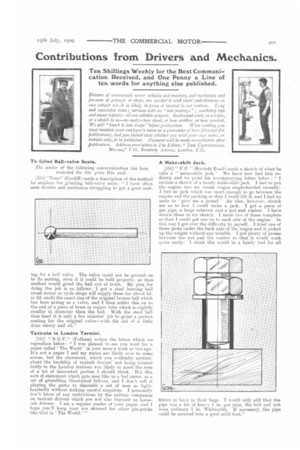Contributions from Drivers and Mechanics.
Page 19

If you've noticed an error in this article please click here to report it so we can fix it.
Ten Shillings Weekly for the Best Communication Received, and One Penny a Line of ten words for anything else published.
Drivers of commercial motor vehicles and tractors, and mechanics and foremen of garages or shops, are invited to send short contributions on any subject wh.ch is likely to prove a/ interest to our readers. Long and successful runs ; services with no " lost journeys" ; workshop tips and smart repairs : all are suitable subjects. Send a post-card, or a letter, or a sketch to us—no matt6.r how short, or how written, or how worded. We will "knock it into shape" before publication. When writing you must mention your employer's name as a guarantee of bon:tildes (not for publication), and you should state whether you wish your own name, or initials only, to be published. Payment will be made immediately after publication. Address your letters to 7 he Editor," THE COMMERCIAL.
MO FOR," 7-15, Rosebery Avenue, London, E.C.
To Grind Ball-valve Seats.
The sender of the following communication has been awarded the 10s. prize this week.
05-1] "Tour" (Cardiff) sends a description of the method he employs for grinding ball-valve seats : " I have often seen drivers and mechanics struggling to get a good seat
ing for a ball valve. The valve could not be ground on to its seating, even if it could be held properly, as that method would grind the ball out of truth. My plan for doing the job is as follows: I get a steel bearing ball (most motor or cycle shops will supply these for about lcl. or 2d. each) the exact size of the original bronze ball whir:11 has been acting as a valve, and I then solder this on to the end of a piece of brass or copper tube which is slightly smaller in diameter than the ball. With the steel ball thus fixed it is only a few minutes' job to grind a perfect seating for the original valve—with the aid of a little flour emery and oil."
Taxicabs in London Termini.
[555] " B.D.V." (Fulham) writes the letter which we reproduce below: " I was pleased to see you went for a paper called The World ' in your issue a week or two ago. It's not a paper I and my mates are likely ever to come across, but the statement, which you evidently spotted, about the hardship of taxicab drivers' not being treated fairly in the London stations was likely to meet the eyes of a lot of interested parties I should think. It's this sort of statement which gets men like us a had name, as a set of grumbling dissatisfied fellows, and I don't call it playing the game to discredit a set of men so lightheartedly without making careful enquiries. I personally don't know of any restrictions by the railway companies on taxicab drivers which are not also imposed on horsecab drivers. I am a regular reader of your paper, and I hope you'll keep your eye skinned for other pin-pricks like that in 'The World.' "
A Make-shift Jack.
[556] " P.P." (Burdett Road) sends a ketch of what he calls a " make-shift jack." We have now had this redrawn and we print his accompanying letter below : " I enclose a sketch of a handy make-shift jack. I had to put the engine into my steam wagon single-handed recently. I had no jack which was short eiwugh to go between the engine and the packing so that I could lift it, and I had no mate to give me a pound.' An idea, however, struck me as to how I could make a jack. I got a piece of gas pipe, a large setscrew and a nut and washer. I have drawn these in my sketch. I made two of these complete so that I could get one on to each side of the engine. In this way I got over the difficulty by myself. I tried one of these jacks under the back axle of the wagon and it picked up the weight without any trouble. I put plenty of grease between the nut and the washer so that it would work quite easily. I think this would be a handy tool for all fitters to have in their bags. I would only add that the pipe was a bit of heavy 1 in. gas pipe, the bolt and nut were ordinary 1 in. Whitworth. If necessary, the pipe could be screwed into a good solid foot."




















